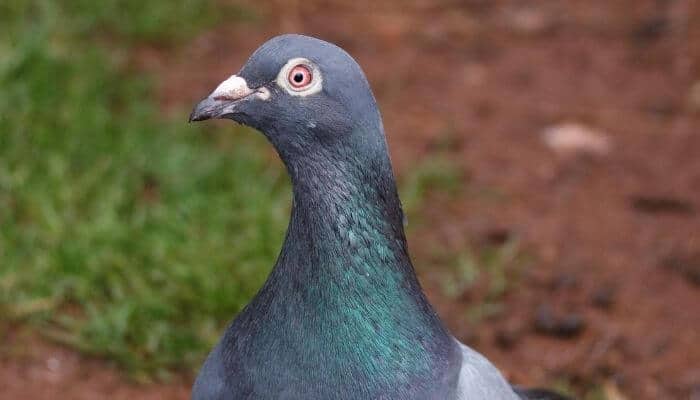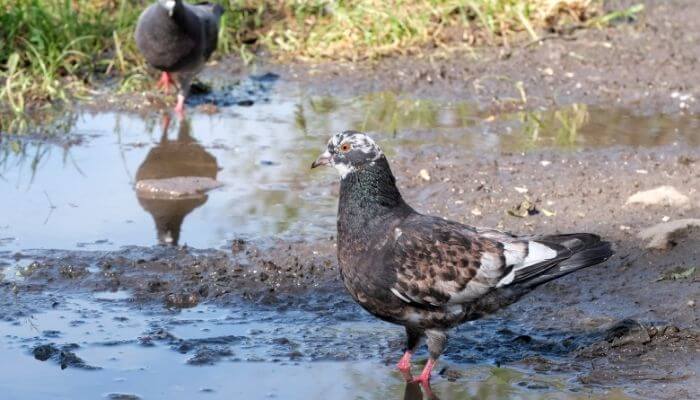Pigeons are often likened to flying garbage bins – a reputation gained by their habit of eating discarded human food in our towns and cities.
So if pigeons eat anything and everything, why would they eat clay?
Pigeons do eat clay, the main reasons for this are:
- curiousity – pigeons will eat almost anything.
- clay contains salt which helps break down nutrients making it easier to absorb them.
- clay absorbs toxins in a pigeons diet.
Clay is a Source of Salt
As a herbivore, a pigeon will not get the whole spectrum of nutrients it needs from a mainly plant-based diet.
Just like any living creature, pigeons need vitamins and minerals and seeds, nuts and grasses will not provide the whole range.
You might not imagine that clay provides any nutritional benefit, and it is too fine to be used as grit in the grinding process in the gastrointestinal tract.
However, all types of clay contain various salts in varying degrees with some richer in sodium, others richer in potassium, magnesium and silica.
By consuming the clay, pigeons ingest some of the key salts they need.
As an Amazon Associate I earn a small fee from qualifying purchases made through Amazon links. This helps us run the site – thanks for your support!
There is no specific study on pigeons but research by Machelle Pacion identified the important relationship between sodium and the digestive process in the aforementioned Amazon Macaws.
As there are many biological similarities in birds, it is not unreasonable to assume his conclusions are applicable to pigeons too.
He found that sodium is the hydrolysis process – the breaking down of nutrients to enable their absorption. Sodium draws out the digestive juices that carry out hydrolysis.
It Helps to Absorb Toxins
Another hypothesis is that a pigeon will eat clay to facilitate toxin absorption.
The diet of birds means that they are always at risk of ingesting something harmful and eating clay enables pigeons to get the benefits of the food without being negatively affected by any toxins that might be present.

It is a clever way to neutralize any harm in the food.
You can think of pigeons eating clay in the exact same way that taking activated charcoal pills has become a recent health trend for humans.
Essentially, these two things produce the same end result of absorbing potential toxins.
This idea should also be familiar to anybody who has ever been to a spa and undergone a toxin-absorbing clay body wrap treatment!

Some of the items that a pigeon might eat which will need to be neutralized by eating clay include the likes of acorns, apple seeds, almond nut pith and peach pits.
Any foodstuff that contains more than trace levels of compounds like quinine and tannic acid is also not good for pigeons.
Do Other Animals Eat Clay?
It can be concluded that clay is essential to the overall good health and stable homeostasis of our pigeons but is this phenomenon of eating clay something that is just reserved for the pigeons and other birds of this world?
The answer is definitely no.
Though birds might be the most likely to eat clay from places like shallow river beds regularly, a number of other animal species have been discovered to ingest the same substances for the same reasons of toxin absorption and nutrient ingestion.
The types of animals that eat clay are very wide-ranging and includes:
- Elephants
- Monkeys
- Buffalo
- Deer
- Butterflies
- Big cats
In parts of the world where the environment and food options carry a greater risk of toxicity, some of these animals rely on clay to provide the toxin absorption that can be the difference between life and death for them, especially when they are in the process of making long migratory trips away from familiar drinking holes and food sources.
Now you know that pigeons do indeed eat clay, and more importantly, you know exactly why they do it as well!
The more we know about the animal kingdom, the better we can become at living in harmony with the wonderful creatures on this planet.
And yes, we do happen to think that a humble pigeon is wonderful as a giant elephant!
